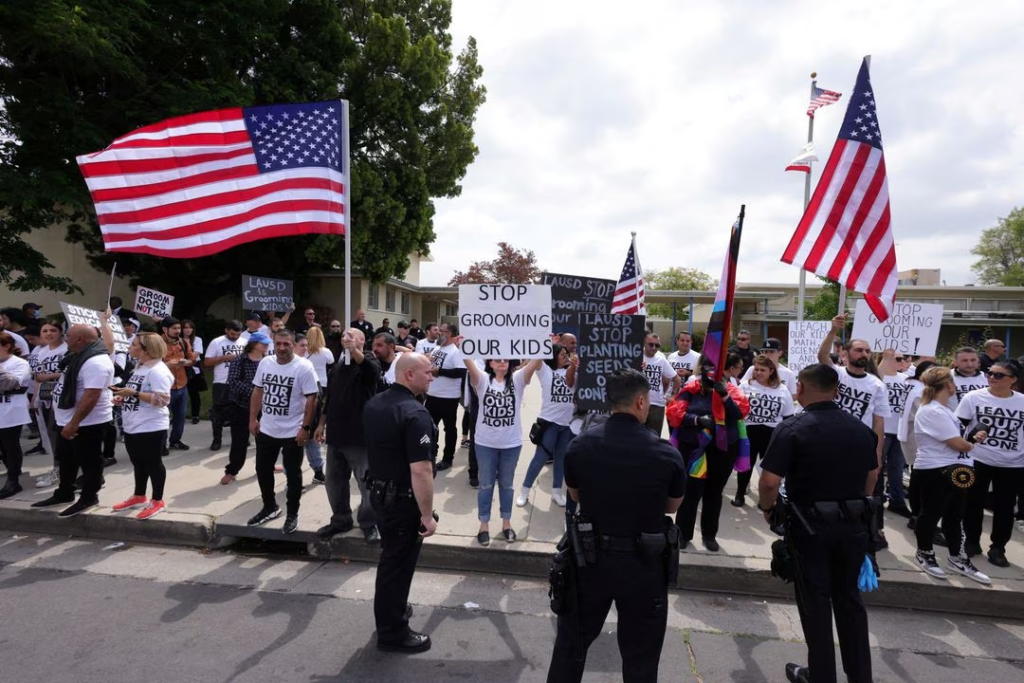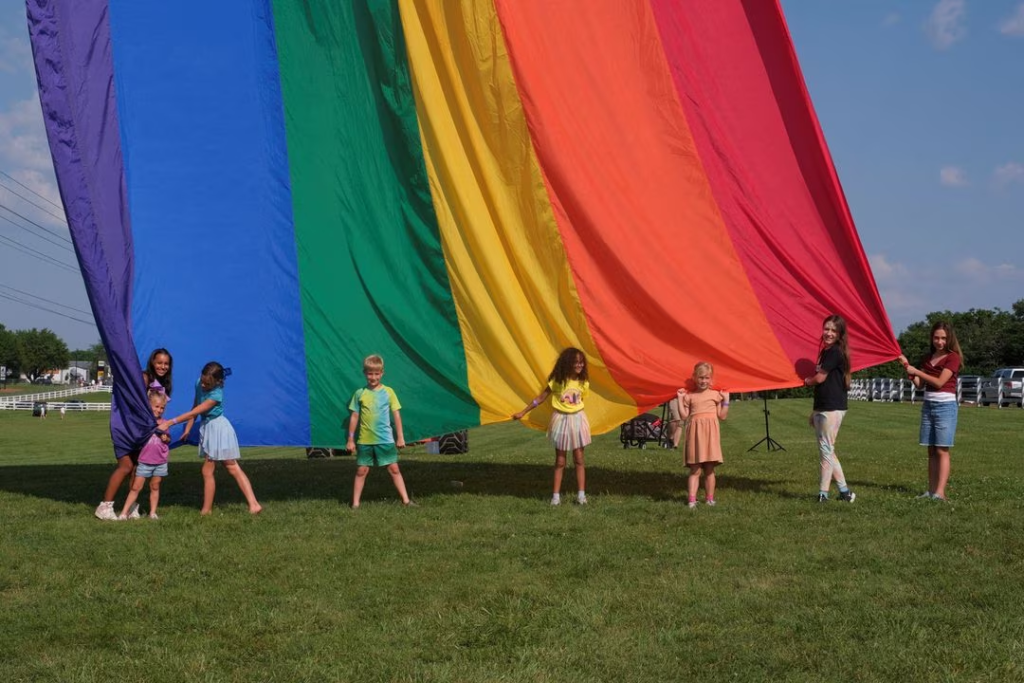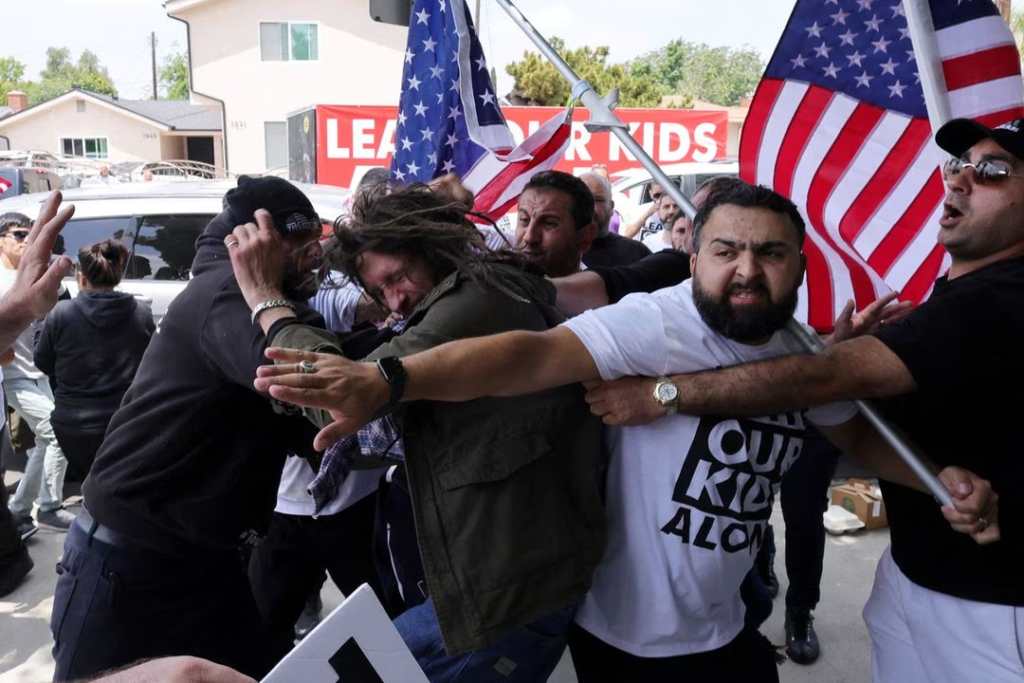The LGBTQ community in the United States is coming together for Pride celebrations against a disconcerting backdrop of escalating attacks, both online and offline. These assaults are being fueled by a combination of rising demonstrations, legal efforts to restrict LGBTQ rights, and inflammatory political rhetoric that has sparked national conversations. According to researchers, these factors seem to be intertwining and reinforcing each other, exacerbating the challenges faced by the community.
Recent data analyzed by Jay Ulfelder, a political and data scientist at Harvard University, reveals a startling increase in anti-LGBTQ demonstrations since 2017. The numbers have surged about 30-fold compared to four years ago, with right-wing protests nearly quadrupling their inclusion of anti-LGBTQ narratives. This alarming trend has sent shockwaves through queer youth organizations like Kaleidoscope in Columbus, Ohio, where an April fundraiser was disrupted by neo-Nazis brandishing swastikas and a chilling sign reading, “there will be blood.” Despite these distressing incidents, the local community’s subsequent support has only fortified their determination to celebrate Pride, albeit with heightened caution and new security protocols.
GLAAD, an LGBTQ advocacy organization, has already documented eight Pride events in 2023 that have been compelled to modify their plans due to threats of violence. Half of these incidents have occurred in Florida, prompting event organizers to enhance security measures this year. Meanwhile, instances of violence are not limited to online spaces. Just recently, in Glendale, California, three individuals were arrested following a violent outbreak outside a school district meeting addressing LGBTQ inclusivity.

The surge in attacks on the LGBTQ community is not confined to physical altercations alone. Legal maneuvers to restrict LGBTQ rights have been on the rise, as evidenced by the American Civil Liberties Union (ACLU) tracking a record-high of 491 anti-LGBTQ bills in state legislatures across the country. Furthermore, a Republican-led effort has sought to curtail drag performances in at least 15 states in recent months. Florida, in particular, has extended Governor Ron DeSantis’s controversial initiative that limits LGBTQ discussions in schools, known as the “Don’t Say Gay” bill, to cover all public school grades. Critics argue that such measures further marginalize and endanger LGBTQ students while proponents claim that parents should retain sole authority over when certain topics, such as sexuality and gender identity, are broached with their children.

In the digital realm, harmful narratives and slurs targeting the LGBTQ community have transcended the fringes and permeated mainstream discourse. The Center for Countering Digital Hate (CCDH) and the Human Rights Campaign reported a staggering 406% surge in tweets containing the term “grooming” following the passage of the “Don’t Say Gay” bill in March 2022. Such rhetoric, which falsely portrays LGBTQ individuals as “child groomers” or pedophiles, was rare prior to the bill’s enactment. Experts warn that these false narratives can fuel violence and pose a grave threat to the community’s safety.
While establishing a causal relationship between online and offline attacks remains challenging, it is clear that the two realms mutually reinforce each other. Joel Day, research director at a Princeton University initiative tracking political violence nationally, cautions against overlooking the influence of events such as the “Don’t Say Gay” bill, which can intensify online discussions and, in turn, increase the likelihood of similar legislative actions. The psychological toll inflicted by both online and offline assaults on the LGBTQ community is inextricable, amplifying the urgency for effective solutions.

In the face of these mounting challenges, LGBTQ individuals like Brigitte Bandit, a full-time drag performer from Austin, Texas, find themselves subjected to unprecedented levels of online hostility. Bandit recounts the pervasive harassment, with social media accounts sharing manipulated images alongside baseless claims that she poses a threat to children. Despite the adversity, Bandit emphasizes the need to embrace the true spirit of Pride, harking back to its origins as a commemoration of the Stonewall riots in 1969, which erupted following a police raid on a gay bar in New York City.
As the LGBTQ community marches forward, it becomes increasingly crucial to recognize the resilience and strength that unite them during Pride celebrations. It is a collective effort to reclaim their narratives, advocate for their rights, and build a more inclusive society that celebrates diversity and affirms the worth and dignity of every individual.

